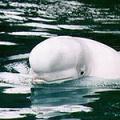 在下週國際捕鯨委員會年會即將召開之際,一群保育人士公佈了一項最新研究,指出氣候變遷已導致鯨魚、海豚和鼠海豚難以存活,因為牠們必須適應冰層縮小或是可捕食動物消失的情況。
在下週國際捕鯨委員會年會即將召開之際,一群保育人士公佈了一項最新研究,指出氣候變遷已導致鯨魚、海豚和鼠海豚難以存活,因為牠們必須適應冰層縮小或是可捕食動物消失的情況。
氣候變遷對於南北極造成相當大的衝擊,此份報告也發現,以極水做為棲地和食物來源的鯨類,諸如白鯨、獨角鯨和北極鯨等等,必須去承受海冰減少所帶來的後果。
由鯨豚保育學會和全球性保育組織世界自然基金會共同發表的報告「暖洋中的鯨群」即指出,這些鯨類還必須應付海水溫度變化,以及因為冰層融化和降雨量增加而改變的海水性質。
而根據美國國家大氣研究中心和美國國家冰雪資料中心在4月發表的報告,最快從2020年開始,極地可能會週期性地出現無海冰的情況。
保育團體則提出警告,當海冰縮小,在過去較不受影響的極地,會出現更多的人類活動,例如商業運輸、石油、天然氣和礦石開採以及軍事活動。
Climate change is making life more difficult for whales, dolphins and porpoises that must adapt to shrinking sea ice and decline in their prey species, according to a new study released by conservationists ahead of next week's annual meeting of the International Whaling Commission.
Climate change impacts are greatest in the Arctic and the Antarctic, and the report finds cetaceans such as belugas, narwhals, and bowhead whales that rely on icy polar waters for habitat and food are likely to suffer most from the reduction in sea ice.
The cetaceans also must deal with changes in sea temperature and the freshening of seawater due to melting ice and increased rainfalls, finds the new report, "Whales in hot water?" published by the Whale and Dolphin Conservation Society and the global conservation organization WWF.
The Arctic could be seasonally free of sea ice as early as the year 2020, according to a report issued in April by the National Center for Atmospheric Research and the University of Colorado's National Snow and Ice Data Center.
As sea ice shrinks, there will be more human activities, such as commercial shipping, oil, gas and mining exploration and development as well as military activities, in previously untouched areas of the Arctic, the conservation groups warn.
全文及圖片詳見 ENS報導






